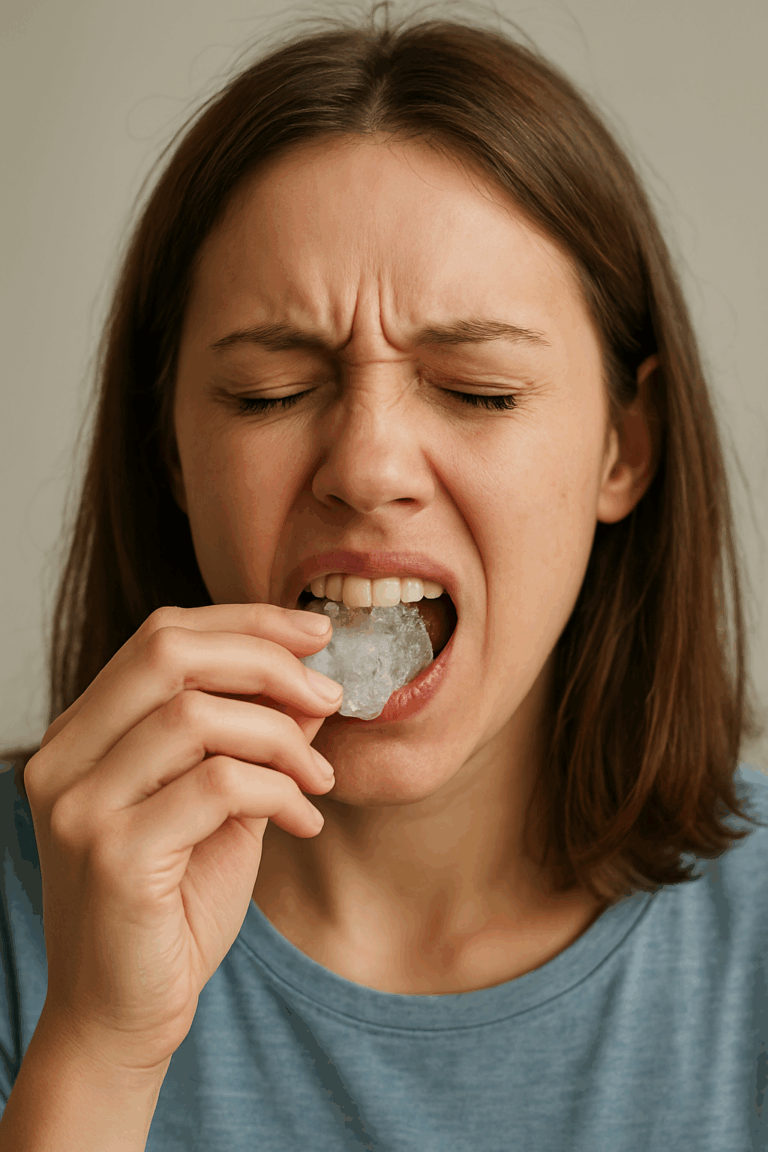Chewing ice is really bad for your teeth. Though it may feel refreshing in the moment, the hardness and cold temperature can weaken enamel, crack teeth, damage dental work, strain your jaw, and even signal underlying health issues. Over time, this seemingly harmless habit can lead to sensitivity, pain, and costly dental treatments. In addition to chewing ice, there are an array of common, everyday habits that can quietly take a toll on your teeth and gums, making awareness and prevention key to maintaining a healthy smile.
At Dental Depot of Arizona, our friendly and experienced providers are here to help if chewing ice has left your teeth vulnerable to chips, cracks, or sensitivity. We offer compassionate, commonsense care that not only repairs damage but also supports you in breaking the habit for good. By focusing on patient education, we give you the tools and knowledge you need to protect your smile and make healthier choices moving forward. With our guidance and care, you can enjoy strong, healthy teeth that last a lifetime.

Chewing ice may seem like a harmless habit, but it can actually pose risks to your dental health. While it might feel refreshing in the moment, the hardness and cold temperature of ice can create challenges for your teeth over time. Dentists often caution against the habit because, even though ice is just frozen water, the repeated crunching can have lasting effects.
When you bite down on something as hard as ice, you place intense pressure on your enamel—the tough outer shell that protects your teeth. Even though enamel is incredibly strong, it isn’t designed to handle repeated force from chewing such a rigid substance. Over time, this stress can cause small cracks or chips to form. While you might not notice them right away, these fractures can worsen, exposing the softer layers beneath the enamel to bacteria and decay. Left untreated, a crack can lead to pain, infection, or the need for more extensive dental treatments, making prevention key to long-term oral health.
Enamel is the hard, protective outer layer of your teeth, and while it’s the strongest substance in your body, it isn’t indestructible. The repeated crunching of ice can gradually chip away at this barrier, thinning and weakening it over time. Once enamel is worn down, it cannot regenerate, leaving your teeth more vulnerable to decay and cavities. As a result, you may experience heightened sensitivity to hot or cold foods, sweets, and even brushing. Protecting your enamel is important because it’s your teeth’s first defense against long-term damage.
Dental restorations like fillings, crowns, veneers, and bridges are carefully designed to restore your smile, but they are not built to withstand the excessive force of chewing ice. The hardness of ice creates stress points that can crack or dislodge these restorations. When dental work breaks or comes loose, it not only requires costly repairs but also exposes your natural tooth to further damage and decay. Keeping your restorations intact helps maintain both the function and appearance of your smile.
Chewing ice requires strong, repetitive biting forces that put extra strain on your jaw joints and muscles. Over time, this stress can lead to discomfort, stiffness, or even pain in the temporomandibular joint (TMJ), which controls jaw movement. For individuals with existing TMJ disorders, the habit may worsen symptoms, triggering tension headaches, jaw locking, or painful clicking. Even without a diagnosis, chronic jaw strain can affect your ability to chew comfortably and enjoy meals. Protecting your jaw health is essential for avoiding long-term complications.
While chewing ice can damage your teeth directly, constant cravings for ice may signal a deeper health concern. This condition, known as pagophagia, is a type of pica in which people feel compelled to eat non-food substances. Pagophagia is often associated with iron deficiency anemia, meaning your body may not be getting enough oxygen-rich blood. Left untreated, this deficiency can lead to fatigue, weakness, and other health issues. If you find yourself frequently chewing ice, it’s worth bringing up with your doctor to rule out underlying causes.
If you like the cool crunch of chewing ice, there are safer ways to satisfy the urge without putting your teeth at risk.
The key is finding something that works for you, without hurting your smile in the process.
It’s not just chewing ice that can cause problems for your teeth—many common habits can quietly wear down your smile over time. Often, people don’t even realize that the things they do every day may be putting extra stress on their teeth and gums. These behaviors might seem harmless in the moment, but they can have lasting consequences for your oral health.
Have you ever used your teeth to tear open a snack bag? Or pop a tag off a new shirt? This bad habit might save a few seconds, but it’s a risky move. Teeth are not made for those kinds of jobs and using them this way can lead to chips and cracks. Next time, reach for scissors instead.
It’s a common nervous habit, especially during long meetings or study sessions, but gnawing on pens or pencils creates pressure and friction that can wear down enamel. It can also irritate your jaw muscles and put your teeth at risk for chipping.
Yes, you can have too much of a good thing. Brushing with a heavy hand or using a hard-bristled toothbrush can actually erode your enamel and irritate your gums. Instead, use a soft-bristled brush and gentle circular motions. It cleans just as well, without the damage.
Teeth grinding or clenching is often an unconscious habit, especially during sleep or stressful times. Over time, grinding (also called bruxism) wears down your teeth and can cause jaw pain, headaches, and sensitivity.
If you think you might be grinding your teeth, talk to your dentist. A night guard can help protect your teeth while you sleep, and stress management techniques can also make a big difference.
That iced coffee or soda you sip throughout the day may keep you going, but it also keeps your teeth in constant contact with sugar and acid. That gives bacteria more time to do damage and increases your risk for cavities.
Instead, try to finish drinks with meals and rinse your mouth with water afterward. Even switching to a straw can help minimize contact with your teeth.
Whether it’s done out of boredom, stress, or without even noticing, the repeated pressure of chewing on your straw can slowly wear down enamel. Over time, this added strain increases the risk of tiny chips or other damage. Breaking the habit helps keep your teeth strong and protected.
It’s not just a problem for your hands. Nail biting can cause your teeth to shift out of place, especially the front ones. It can also introduce bacteria from your hands into your mouth, raising your risk for infection or gum irritation.
At Dental Depot of Arizona, we’re here to support every aspect of your dental health, from preventive care that keeps problems from starting to restorative treatments that help your teeth recover from habits like chewing ice. With multiple locations across the Valley, convenient hours, and Saturday appointments available at select offices, we make it easier to fit comprehensive, high-quality dental care into your busy schedule. Best of all, our affordable, commonsense pricing ensures that protecting and restoring your smile is always within reach, so you can enjoy strong, healthy teeth for years to come. Schedule an appointment today and find out how Dental Depot of Arizona can help preserve your smile!
Yes, chewing ice can crack or chip your teeth, wear down enamel, damage dental work, strain your jaw, and even signal underlying health issues like iron deficiency anemia. Over time, the habit can cause sensitivity, pain, and costly treatments.
Chewing ice can crack or chip teeth, thin enamel, break fillings, crowns, or veneers, and create strain on your jaw joints and muscles. Even small cracks can worsen over time, exposing the inner layers of your teeth to bacteria and decay.
Constant cravings for chewing ice may be a sign of an underlying health condition called pagophagia, often linked to iron deficiency anemia. If you find yourself frequently chewing ice, it’s best to discuss it with your doctor.
Safer options include letting ice melt in your mouth, eating frozen fruit, chilled vegetables, sugar-free popsicles, frozen yogurt, or chewing sugar-free gum. These alternatives give you the same cool sensation without risking damage to your teeth.
Yes, your dentist can help repair any damage caused by chewing ice and provide education, tools, and strategies to break the habit. At Dental Depot of Arizona, we focus on prevention and long-term oral health so you can maintain a strong, healthy smile.

If chewing ice has left your teeth cracked, chipped, or sensitive, Dental Depot of Arizona is here to help. Schedule your appointment today and keep your smile strong for life!